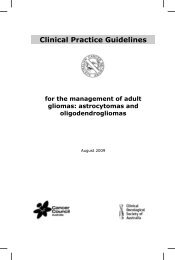Clinical Practice Guidelines for the management of locally advanced ...
Clinical Practice Guidelines for the management of locally advanced ...
Clinical Practice Guidelines for the management of locally advanced ...
You also want an ePaper? Increase the reach of your titles
YUMPU automatically turns print PDFs into web optimized ePapers that Google loves.
production <strong>of</strong> androgens which drive cancer growth. There have been twelve small- to medium-sized<br />
randomised clinical studies assessing a variety <strong>of</strong> second-line hormone manipulations. Although <strong>the</strong><br />
studies are numerous, <strong>the</strong> amount <strong>of</strong> meaningful data is limited. This is due to <strong>the</strong> small size <strong>of</strong> many<br />
<strong>of</strong> <strong>the</strong> studies introducing a significant risk <strong>of</strong> a bias, differing primary hormone <strong>the</strong>rapies and<br />
manipulations. Interventions included institution <strong>of</strong> non-steroidal anti-androgens if not already being<br />
taken 2 ; comparisons <strong>of</strong> anti-androgens with low-dose corticosteroids 3, 4 and oestrogens 5, 6 ;<br />
comparisons <strong>of</strong> megesterol acetate with oestrogens 7 and corticosteroids 8 ; high-dose oestrogens 9 ;<br />
medroxyprogesterone acetate 10 ; and adrenal androgen suppression with agents like ketoconazole (with<br />
hydrocortisone). 11<br />
No second-line hormone manipulation has clearly been shown in a randomised controlled trial (RCT)<br />
to lead to an improvement in overall survival. It is unknown whe<strong>the</strong>r this is because this strategy is<br />
not effective in enough people to affect <strong>the</strong> overall survival <strong>of</strong> <strong>the</strong> population or because <strong>of</strong> <strong>the</strong> paucity<br />
<strong>of</strong> well-powered trials to answer this question. It is well demonstrated that a minority <strong>of</strong> patients will<br />
have some evidence <strong>of</strong> prolonged (greater than 12 months) disease control as evidenced by reduction<br />
in symptoms and/or PSA declines and rarely, changes in radiographic evidence <strong>of</strong> disease. 5, 11 For<br />
patients who had previously undergone castration only, <strong>the</strong>re was no significant difference between<br />
<strong>the</strong> response rates <strong>for</strong> anti-androgens and prednisone or diethylstilbestrol. 3-5 For patients who had had<br />
failed combined androgen deprivation, <strong>the</strong>re were significant clinical and/or biochemical<br />
improvements with changing <strong>the</strong> anti-androgen 2 and, when anti-androgens were withdrawn, with<br />
ketoconazole and hydrocortisone. 11 There are no RCTs comparing ketoconazole with o<strong>the</strong>r secondline<br />
hormone <strong>the</strong>rapies.<br />
There are no RCTs examining <strong>the</strong> effects <strong>of</strong> androgen withdrawal. Case series have shown that <strong>for</strong> a<br />
subgroup <strong>of</strong> patients who have progressed on combined androgen deprivation, withdrawal <strong>of</strong> <strong>the</strong> antiandrogen<br />
can cause a decline in PSA levels. 11-13 In one <strong>of</strong> <strong>the</strong> larger and more recent series 11% <strong>of</strong><br />
patients who stopped anti-androgen (flutamide, bicalutamide or nilutamide) <strong>the</strong>rapy had a PSA<br />
decrease > 50% which lasted a median <strong>of</strong> 5.9 months. 11<br />
The lack <strong>of</strong> clear-cut data guiding <strong>the</strong>rapy <strong>for</strong> this patient population is problematic because most<br />
patients with metastatic prostate cancer progress on androgen deprivation and any response from<br />
altering hormonal <strong>the</strong>rapy regimens is short-lived <strong>for</strong> most patients with our current agents. As such,<br />
findings from studies in this setting are relevant to a large patient population. Guidance and<br />
availability <strong>of</strong> agents to treat this patient population is a significant clinical need, as once progression<br />
is demonstrated, <strong>the</strong> patients have a relatively short life expectancy. All <strong>of</strong> <strong>the</strong> agents listed above<br />
have a manageable side-effect pr<strong>of</strong>ile and would favour trialling a hormone manipulation, especially<br />
in patients with no or minimal symptoms. This approach will not inappropriately defer <strong>the</strong> institution<br />
<strong>of</strong> chemo<strong>the</strong>rapy, which will be used when a patient has progressed, and <strong>the</strong> manoeuvre possibly<br />
results in significantly delaying <strong>the</strong> use <strong>of</strong> chemo<strong>the</strong>rapy in a minority <strong>of</strong> patients.<br />
The agents that can be employed as second-line hormone manipulations are generally available in<br />
Australia and have a mild side-effect pr<strong>of</strong>ile which makes it feasible to trial <strong>the</strong>se in most patients.<br />
The one caveat is ketoconazole, which, when used in high doses (400mg tds) can cause some<br />
significant adverse events. 11 This can be minimised by close monitoring <strong>of</strong> liver function tests and<br />
starting with 200mg tds with replacement doses <strong>of</strong> hydrocortisone and escalate as tolerated. Antiandrogens<br />
and low-dose corticosteroids are available on <strong>the</strong> PBS <strong>for</strong> metastatic prostate cancer.<br />
Ketoconazole however is not available and costs approximately $150 per month unless it is on a<br />
hospital <strong>for</strong>mulary <strong>for</strong> this indication. Only one RCT examined quality <strong>of</strong> life outcomes using a<br />
validated instrument, <strong>the</strong> EORTC-C30 instrument. In that study overall quality <strong>of</strong> life scores, pain<br />
scores and gastrointestinal symptom scores were significantly better with prednisone as compared<br />
with flutamide over 24 weeks. 3<br />
To help put <strong>the</strong> prior data in <strong>the</strong> context <strong>of</strong> current drug availability, one has to consider <strong>the</strong> following.<br />
With <strong>the</strong> emergence <strong>of</strong> chemo<strong>the</strong>rapy and/or stage migration and/or improved supportive cancer care,<br />
<strong>Clinical</strong> practice guidelines <strong>for</strong> <strong>the</strong> <strong>management</strong> <strong>of</strong> <strong>locally</strong> <strong>advanced</strong> and metastatic prostate cancer<br />
76



